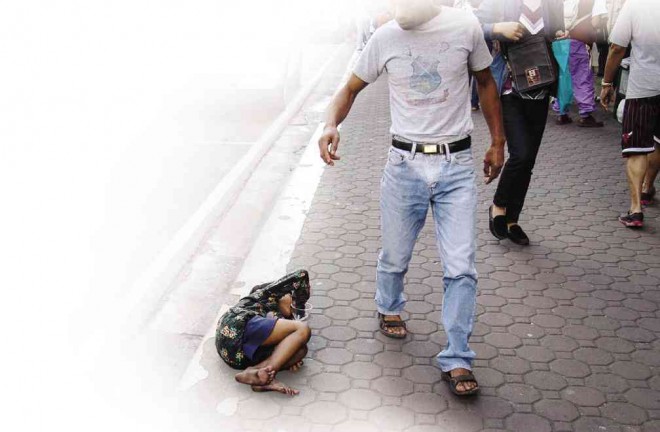In Baguio, beggars told to spare kids

A BADJAO child sleeps on the sidewalk in Baguio City, taking a break from begging for alms in a city that is searching for ways to keep the children from harm. RICHARD BALONGLONG/INQUIRER NORTHERN LUZON
BAGUIO CITY—Social workers here have warned indigenous Filipino families of losing custody of their children if they continue to send them out into the city’s streets to beg.
Betty Fangasan, who heads the Office of the City Social Welfare and Development, said social workers informed the families, who they believe to belong to the Badjao tribe, that if they were found to send their children to beg for the fifth time, social workers would take custody of the children.
Some of the families carry infants and children, as young as 3-year-olds, when they beg in downtown Baguio.
The children would be cleaned and fed at the city’s social welfare facilities, “while their parents go about their business,” Fangasan said.
She said the families could get their children back once they return to their homes in the provinces of Pangasinan, La Union and Pampanga.
Article continues after this advertisementThe families frequent Baguio, particularly during the peak tourist season. They have been profiled and their case workers have been sharing information with social workers in the three provinces where many of the families live, Fangasan said.
Article continues after this advertisementShe said social workers are taking a more aggressive stance upon advice by Social Welfare Secretary Corazon Soliman, when she was told that local social workers have been restrained from taking action against Badjao families due to Republic Act 8371 (Indigenous Peoples’ Rights Act). Ipra recognizes and enforces indigenous Filipino rights.
But Soliman, who met with local leaders last month, said the best interest of children is a “higher goal” and should supercede Ipra in cases where parents endanger their children.
Soliman was recently criticized for rounding up street dwellers in Manila during the papal visit, for an orientation seminar on a modified conditional cash transfer (CCT) program that now serves street people.
“People who criticized [Soliman] do not understand the difficulty of communicating with street families,” said Fangasan.
“Many of them refuse help. They live outside the law and are usually not on any government records,” she said.
Fangasan added that it took time for social workers to convince the Badjao families to accept help.
During a visit here, Soliman said Badjao families are entitled to the modified CCT.
The regular CCT, which is the brainchild of now detained former President Gloria Macapagal Arroyo, provides poor families monthly cash grants of as much as P1,400, provided the families keep three of their children in elementary and high school, and bring them regularly for medical checkups in government health facilities.
The modified CCT is focused on people who are homeless, said Fangasan. Vincent Cabreza, Inquirer Northern Luzon